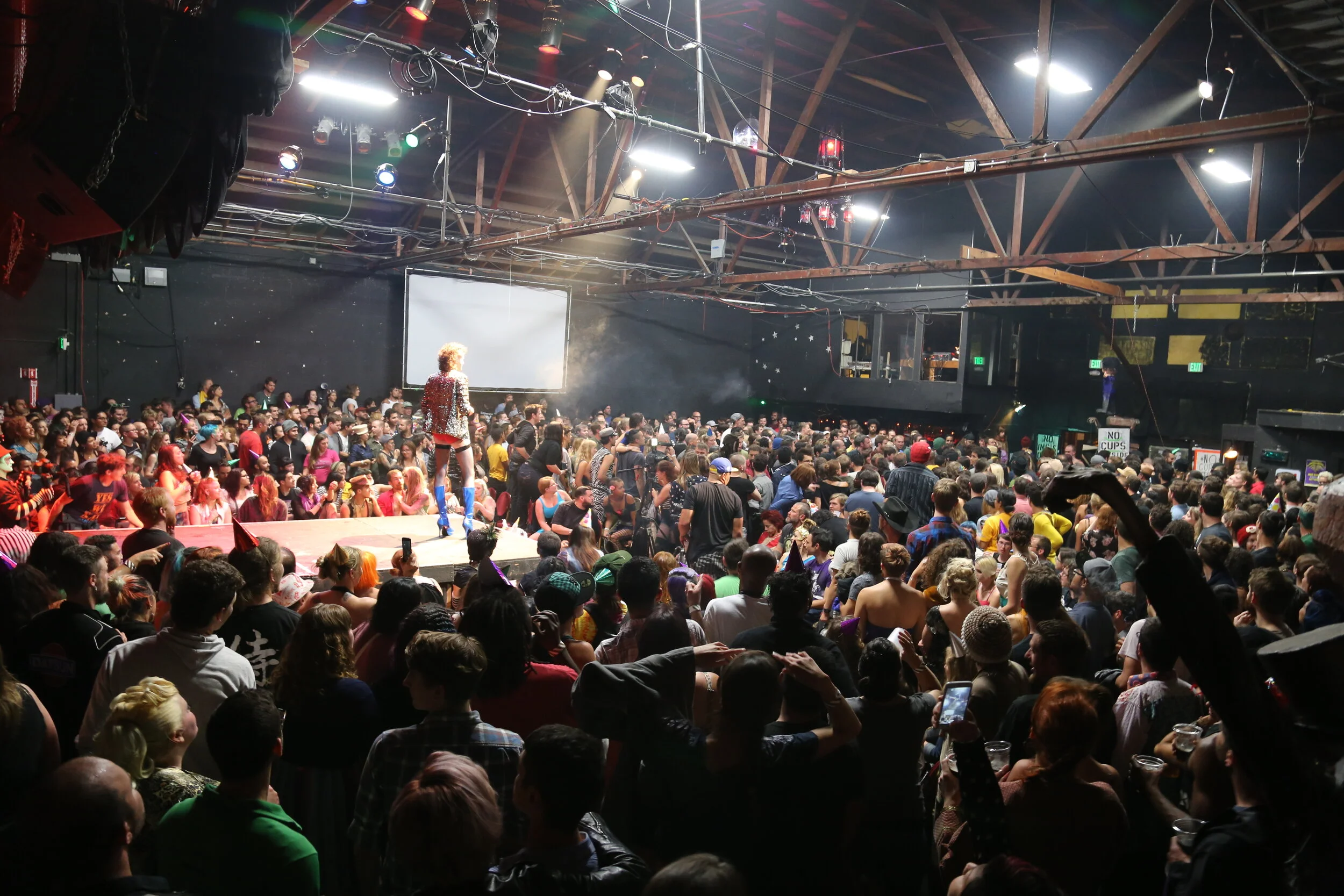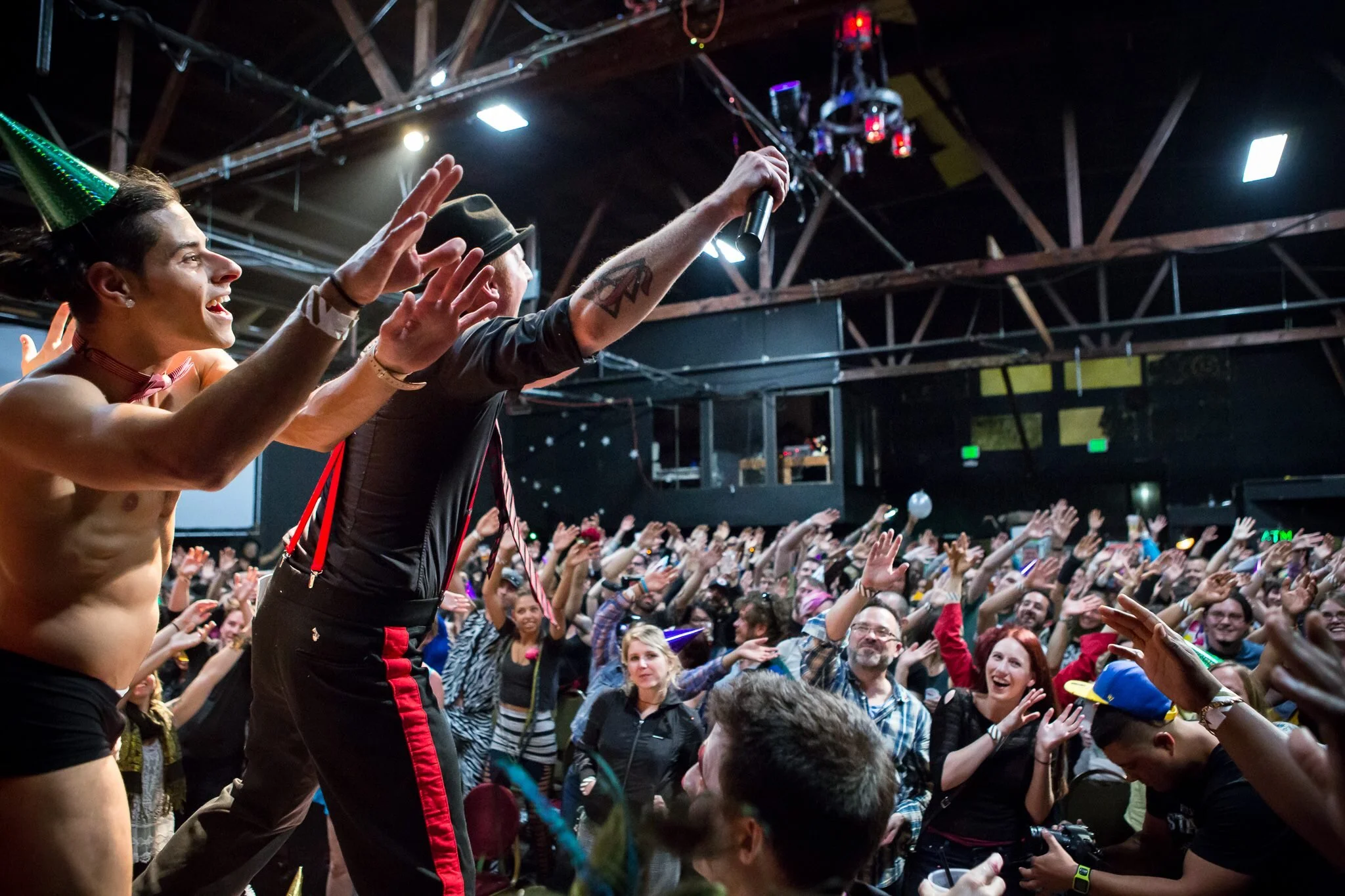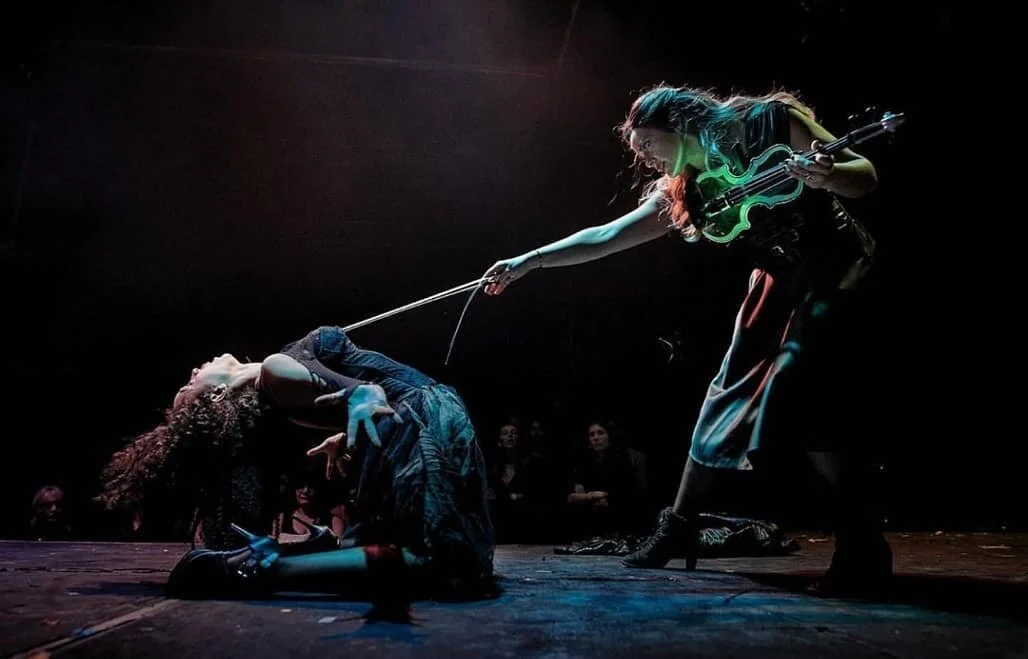
The Legacy
It’s been called “one of the best underground performance art shows in America” by the Huffington Post, but the humble roots of The Ruckus Revival started in 1998 in the small suburban city of Benicia.

Originally called Tourettes Without Regrets, the show was created by a young 21 year old writer and performer named Jamie DeWolf, who says the show started “because I got in trouble for my writing all the time, even as a kid. I had to put a straight jacket on my tongue, but this wasn’t free expression.” DeWolf says the genesis of the show was “out of revenge because I kept getting kicked out of every open mic night in my hometown for reading controversial material. The first time I went to a poetry slam, it was the only place that people wouldn’t kick me out; they would just give me low scores. I remember my first one, I read this really long, confessional piece and the judges just crucified me. One judge gave me a four and clarified that it was a “what for?”
“I felt like there was no place for the mutants of art, and I wanted a clubhouse with all of them under one roof.”
Having never been to a variety show in his life, DeWolf created Tourettes Without Regrets as a showcase for all of the performance he wanted to see in one night, from poetry, freestyle rap, and comedy with shocking audience interactive contests, staged slapstick violence, dark humor and a celebration of genres that weren’t seen by the mainstream. The first show was held in a warehouse in Benicia, and after it’s success, DeWolf started the show as a monthly series in Vallejo, California, in 1999.
Vallejo had never seen a variety show before, and its impact was electric and unexpected, often faced with venue issues. It would lose the venue at the last minute, or the police would come to shut it down. “In the beginning, things would get chaotic. If the event would get shut down we would just pick up and go into the parking lot and do it there. Once I had everyone come back to my place. That was crazy: I had 150 people in my tiny-ass living room doing a rap battle,” recalls DeWolf.
The early years were notorious for presenting acclaimed lyricists contrasted with contests involving flying meat and filmed pranks. DeWolf was constantly reinventing the show and exploring the boundaries of controversy and the edge of expression. He says of that period, “The first incarnation was this really chaotic thing and I quickly learned that actual chaos isn’t very entertaining.” DeWolf’s career quickly exploded onto the national Slam scene, winning championships and refining his performance, building a body of work known for a mix of hip hop, comedy and gritty narratives. The Ruckus Revival evolved with him, developing a more cohesive and celebratory vision, incorporating new art forms along the way.
DeWolf says the roots of the show are “Psychotic erotic vaudeville. It’s taking highbrow and lowbrow and making them collide in this demolition derby.” Genres seem irrelevant. DeWolf explains, “If you’ve never been to a rap battle, if you’ve never been to a poetry slam, if you’ve never seen burlesque, if you’ve never seen stand-up comedy, or dirty haiku, or freakish, inventive contests — then that’s what the show is for, to put all of those elements into one show. What makes ‘Tourettes’ individual and unique is throwing all of these elements together and seeing what happens.”
“A night of dirty haikus, rap battles, wild aerialists, burlesque, and much more. The ultimate performance showcase that is as weird as it is riveting. You will not see as much madness anywhere else.”
— The Huffington Post

The show grew rapidly when it moved to its home at the Oakland Metro, winning “Best of the Bay” awards as it exploded in popularity, consistently selling out every show. As DeWolf became a bona fide circus ringmaster across the Bay Area for circus companies like Vau de Vire Society and the Bohemian Carnival, the show incorporated even more types of physically stunning acts from aerial performance, acrobatics and contortion. The show has since become the largest and longest running variety show on the West Coast.
DeWolf wants audience members to walk away vibrating with a need to create.
“The Ruckus Revival celebrates underground performers, the kinds you won’t see on TV shows like ‘The Voice.’ It’s all original artists who aren’t doing this to be glorified but to share their art,” said DeWolf. The goal of each show is to get the audience inspired. He explains that he wants people to go home wanting to write, paint, sing, dance, and then come back and sign up to perform.
Part poetry slam, part circus and part rap battle, the event incorporates audience participation and an open mic, billing itself as “the fight club of underground art.” Almost 16 years later, DeWolf has become an internationally recognized touring performer featured on HBO, NPR, and an award-winning feature film director. He’s matured from the rowdy raconteur with a chip on his shoulder into the two-time winning “Best Poet” and “Best Film-Maker” of the East Bay, but the renegade spirit of the The Ruckus Revival still survives.
With the key additions of performance poet Wonder Dave and burlesque contortionist Hunny Bunnah to his crew, and with his ‘anchor’ and co-producer Krystal Ashe, the show continues to dazzle, delight and challenge audiences for a night unlike any other in the performance world.

Since those early days, DeWolf has become one of the most in demand MC’s in the Bay Area for his irreverent improv, penchant for audience interaction and over the top theatrics. DeWolf says: “I’m promising to push their boundaries, to blow their mind, but also to make something feel absolutely alive. It’s like being a reverse cult leader as I’m being naked about wanting to brain wash you for your own entertainment and for a hell of a lot cheaper.”
In the interim, they’ve created “the most consistently spectacular event that Oakland’s ever seen.”
The show continued throughout the pandemic in an online format, winning praise for bringing the same energy, interaction and fierce irreverent spirit to the screen. They push forward, putting on renegade shows in outside spaces.



